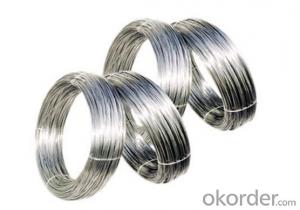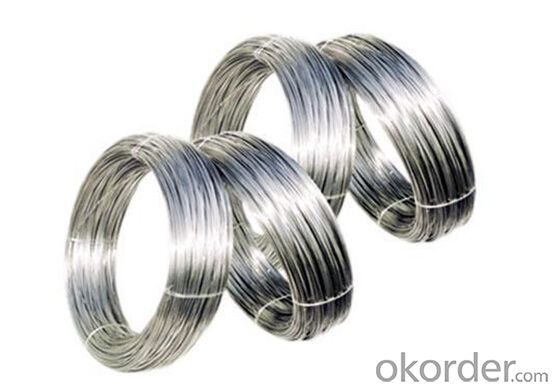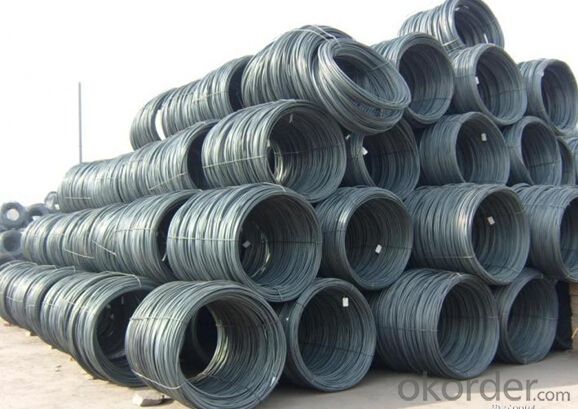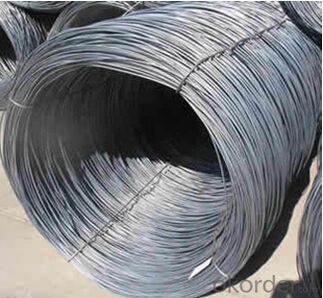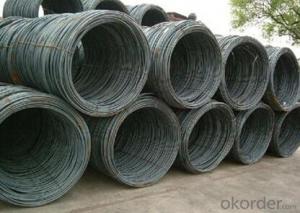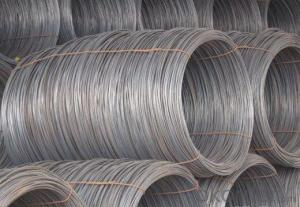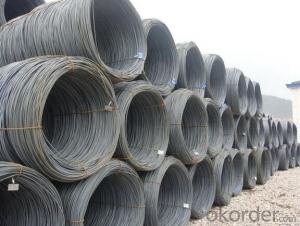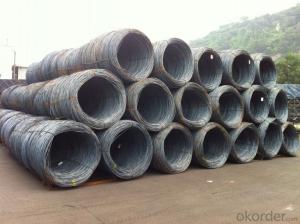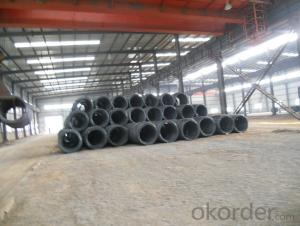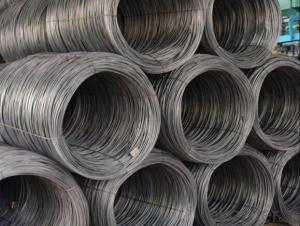Grade SAE 1006 Hot Rolled Steel Wire Rod in Coils
- Loading Port:
- Tianjin
- Payment Terms:
- TT OR LC
- Min Order Qty:
- 3 m.t.
- Supply Capability:
- 10000 m.t./month
OKorder Service Pledge
Quality Product, Order Online Tracking, Timely Delivery
OKorder Financial Service
Credit Rating, Credit Services, Credit Purchasing
You Might Also Like
Specification
Type:
Carbon Steel,Spring Steel,Bearing Steel,Gear Steel,Deformed Steel,Stainless Steel,Alloy Steel
Shape:
Steel Coil,Steel Sheet,Steel Wire Rod,Steel Flat Bar,Steel Square Bar,Steel Angle,Steel Round Bar,Steel Billets
Technique:
Hot Rolled,Cold Rolled,Cold Drawn,ERW,Forged,Saw,Extruded,EFW,Spring
Surface Treatment:
Galvanized,Coated,Copper Coated,Color Coated,Oiled,Dry,Chromed Passivation,Polished,Bright,Black,PVDF Coated
Certification:
ISO,SGS,BV,IBR,RoHS,CE,API,BSI,UL
Thickness:
5.5-12mm
Width:
5.5-12mm
Length:
in coils
Outer Diameter:
5.5-12mm
Net Weight:
2m.t.
Packaging:
seaworthy packaging
Grade SAE 1006 Hot Rolled Steel Wire Rod in Coils
Detailed Information of the Grade SAE 1006 Hot Rolled Steel Wire Rod in Coils
| Name | Hot Rolled High Carbon Wire Rod |
| Shape | Round Bar/Square Bar/Flat Bar/Plate/Wire |
| Standard | GB/ASTM/SAE/AISI/DIN/JIS/EN/BS |
| Surface Treatment: | Black/Peeling/Polished/Machined |
| Delivery Condition: | Hot Rolled or Forged/Peeled or Black Surface |
| Test | SGS/UT 100% Elements Testing |
| Certificate: | ISO/Mill Certificate |
| Service: | 24 hours online service / |
| more than 20 years trading and manufacture | |
| Quality Assurance: | the third party inspection, such as SGS, BV, TUV…etc. is acceptable |
| Packaging Details: | Seaworthy Packaging or as per customer's packing instruction |
Chemical Composition of the Grade SAE 1006 Hot Rolled Steel Wire Rod in Coils
| Grade | Chemical Composition(%) | |||||
| C | Mn | Si | S | P | B | |
| SAE1006B | 0.03~O.07 | ≤0.32 | ≤0.30 | ≤0.045 | ≤0.040 | >0.0008 |
| Mechanical properties | ||||||
| Yield strength(N/mm2) | Tensile strength(N/mm2) | Elongation(%) | ||||
| 250-280 | 350-380 | ≥32 | ||||
Company Introduction the Grade SAE 1006 Hot Rolled Steel Wire Rod in Coils
CNBM International Corporation is the most import and export platform of CNBM group(China National Building Material Group Corporation) ,which is a state-owned enterprise, ranked in 270th of Fortune Global 500 in 2015.
With its advantages, CNBM International are mainly concentrate on Cement, Glass, Iron and Steel, Ceramics industries and devotes herself for supplying high quality series of refractories as well as technical consultancies and logistics solution.
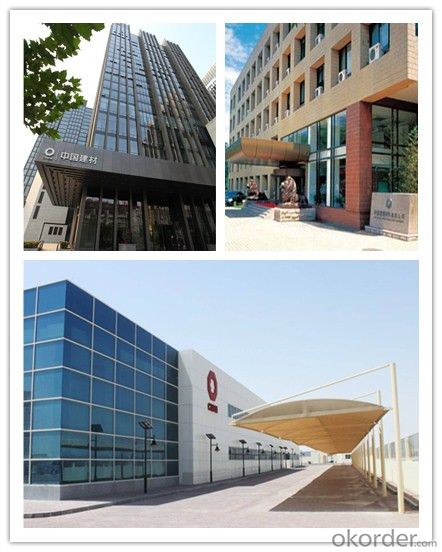
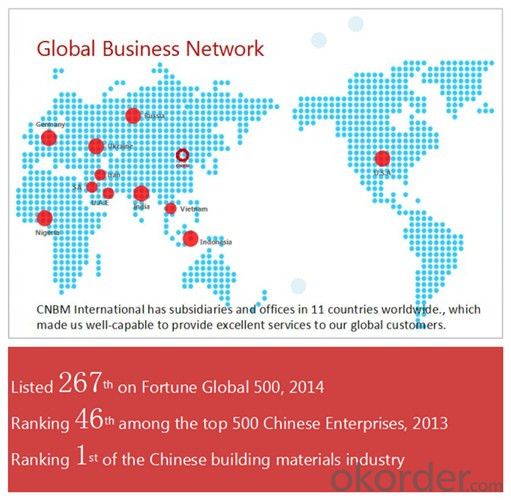
| After-sale service | CNBM provides the services and support you need for every step of our cooperation. We’re the business partners you can trust; you can relax and get on with doing business. |
| For any problem, please kindly contact us at any your convenient time, we’ll reply you in our first priority within 24 hours | |
| Advantages | Industry experience over 20 years. |
| Shipment of goods -More than 70 countries worldwide. | |
| The most convenient transport and prompt delivery. | |
| Competitive price with best service. | |
| High technical production line with top quality products. | |
| High reputation based on best quality products. |
Packaging & Delivery the Grade SAE 1006 Hot Rolled Steel Wire Rod in Coils
| Packaging Detail | Sea worthy packing /as per customer's packing instruction |
| Delivery Detail | 15 ~ 40 days after receiving the deposit |
Products Show
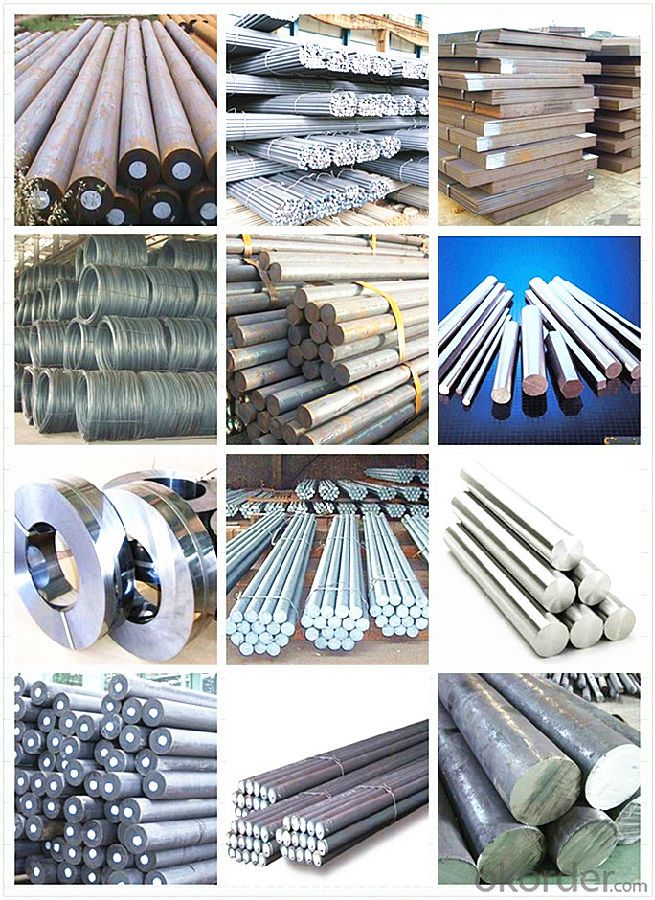
FAQ:
| Are you a trader or manufacturer? | Manufacturer |
| What’s the MOQ? | 3 metric ton |
| What’s your delivery time? | 15-35 days after downpayment received |
| Do you Accept OEM service? | Yes |
| what’s your delivery terms? | FOB/CFR/CIF |
| What's the Payment Terms? | 30% as deposit,70% before shipment by T/T |
| Western Union acceptable for small amount. | |
| L/C acceptable for large amount. | |
| Scrow ,Paybal,Alipay are also ok | |
| Why choose us? | Chose happens because of quality, then price, We can give you both. |
| Additionally, we can also offer professional products inquiry, products knowledge train (for agents), smooth goods delivery, excellent customer solution proposals. | |
| What's your available port of Shipment? | Main Port, China |
| What’s your featured services? | Our service formula: good quality+ good price+ good service=customer's trust |
| Where are your Market? | Covering more than 160 countries in the world |
- Q: What are the main factors affecting the formability of special steel?
- The main factors affecting the formability of special steel include the composition of the steel, its microstructure, temperature, strain rate, and the presence of impurities or defects. These factors influence the ability of the steel to deform without cracking or fracturing during the forming process. Additionally, the mechanical properties, such as the yield strength and ductility, also play a significant role in determining the formability of special steel.
- Q: What are the environmental impacts of manufacturing special steel?
- Manufacturing special steel has significant environmental impacts due to its energy-intensive production process and the extraction of raw materials. The production of special steel requires high temperatures and uses large amounts of fossil fuel-based energy, resulting in substantial greenhouse gas emissions contributing to climate change. Additionally, the extraction of iron ore and other raw materials for steel production can lead to deforestation, habitat destruction, and water pollution. The disposal of steel waste and byproducts also poses challenges, as it can contaminate soil and water sources. Therefore, the environmental impacts of manufacturing special steel must be carefully managed and mitigated through sustainable practices and technologies.
- Q: What are the properties of corrosion-resistant stainless steel?
- Corrosion-resistant stainless steel has several key properties. Firstly, it has a high level of chromium content, typically around 10-20%, which forms a protective oxide layer on the surface of the steel. This oxide layer acts as a barrier, preventing oxygen and moisture from reaching the underlying metal and causing corrosion. Additionally, stainless steel contains other alloying elements such as nickel, molybdenum, and nitrogen, which further enhance its corrosion resistance. These alloys help to stabilize the oxide layer and make it more resistant to corrosion by aggressive substances such as acids, salts, and chlorides. Furthermore, stainless steel is highly durable and has excellent strength, making it suitable for various applications in corrosive environments, including marine, chemical, and food processing industries.
- Q: How does special steel contribute to the agricultural industry?
- In the agricultural industry, special steel plays a crucial role in providing strong and high-performing parts for a range of farming equipment. Its unique characteristics, including strength, toughness, and resistance to corrosion, make it perfect for enduring the challenging conditions encountered in agricultural operations. One important use of special steel in agriculture is in the production of tillage tools like plows, harrows, and cultivators. These tools experience intense forces and abrasion while breaking the soil, and special steel ensures their durability and effectiveness even after extended periods of use. The steel's toughness and resistance to wear reduce the need for frequent replacements, improving the overall productivity and cost-effectiveness of agricultural activities. Moreover, special steel is extensively utilized in the manufacturing of harvesting machinery such as combine harvesters, grain conveyors, and crop processing equipment. These machines require parts that can withstand the continuous stress and impact of harvesting and processing operations. Special steel's exceptional strength and ability to resist fatigue allow these machines to handle heavy loads and endure prolonged usage without compromising performance or safety. Additionally, special steel finds application in constructing irrigation systems, storage tanks, and other necessary infrastructure for efficient water management in agriculture. The steel's resistance to corrosion and durability ensure that these structures can endure the challenging conditions of moisture and chemicals present in agricultural environments, guaranteeing their long-lasting functionality. All in all, special steel significantly contributes to the agricultural industry by providing long-lasting and dependable parts for various farming equipment and infrastructure. Its properties enhance the efficiency, productivity, and longevity of agricultural machinery and structures, ultimately benefiting farmers and promoting the overall sustainability of agricultural practices.
- Q: Can special steel be used in the automotive industry?
- Yes, special steel can be used in the automotive industry. Special steel alloys such as high-strength steel, stainless steel, and tool steel are utilized in various automotive components and structures to enhance durability, strength, and corrosion resistance. These steels are commonly used in areas such as chassis, body panels, engine components, and suspension systems, contributing to improved performance, safety, and fuel efficiency in vehicles.
- Q: Classification of special steel products
- Carbon structural steels are normally used directly under heat supply without heat treatment. The mass fraction of Q195, Q215, Q235 are usually of low carbon steel, good welding performance, good plasticity and toughness, a certain strength, often rolled into a sheet, steel, welded steel pipe, used for bridges, buildings and general manufacturing rivet, screw and nut parts etc.. Q255 and Q275 mass fraction of carbon steel is slightly high, high strength, good plasticity and toughness, can be welded steel, steel rolling, usually forming and plate structure and simple manufacturing machinery, connecting rod, gear coupling, pins and other parts. Plain carbon steel high carbon steel is basically contains alloy elements, the carbon content in the range of 0.65% ~ 1.35%, the production of low cost, easy to obtain raw materials, good machinability, after treatment can obtain high hardness and high wear resistance, so the steel is widely used to manufacture various. Cutting tool, mold, measuring tools.But the red hardness difference of this kind of steel, that is, when the working temperature is greater than 250 degrees, the hardness and wear resistance of steel will decline rapidly, and lose their ability to work. In addition, if carbon tools steel is made into larger parts, it is difficult to harden, and deformation and crack are easy to occur. This kind of steel must ensure both chemical composition and mechanical properties. The number is two digits by the average mass fraction of carbon steel in the 000 fraction (W C * 10000). For example, steel 45 shows the average mass fraction of carbon in steel is 0.45%; 08 steel indicates the average mass fraction of carbon in steel is 0.08%.
- Q: Can special steel be used in the production of surgical implants?
- Yes, special steel can be used in the production of surgical implants. Special steels such as stainless steel or titanium alloys are often chosen for their corrosion resistance, biocompatibility, and mechanical properties, making them suitable for manufacturing surgical implants that need to be durable and compatible with the human body.
- Q: What are the common alloying elements in special steel?
- The common alloying elements in special steel are chromium, manganese, molybdenum, nickel, and vanadium.
- Q: How does special steel contribute to reducing product defects?
- Special steel contributes to reducing product defects by offering superior strength, durability, and corrosion resistance compared to regular steel. This ensures that the components made from special steel are less prone to breakage, wear and tear, or damage during manufacturing, transportation, or usage. Special steel's high-quality characteristics provide a more reliable and consistent performance, resulting in fewer product defects and improved overall product quality.
- Q: How does special steel perform in high-temperature hydrogen environments?
- Special steel is known for its excellent performance in high-temperature hydrogen environments. It exhibits superior resistance to hydrogen embrittlement, corrosion, and material degradation, making it a suitable choice for applications where exposure to high-temperature hydrogen is prevalent. The steel's unique composition and heat treatment processes enhance its mechanical properties and enable it to maintain its structural integrity even in challenging conditions. Overall, special steel demonstrates remarkable performance and reliability when subjected to high-temperature hydrogen environments.
Send your message to us
Grade SAE 1006 Hot Rolled Steel Wire Rod in Coils
- Loading Port:
- Tianjin
- Payment Terms:
- TT OR LC
- Min Order Qty:
- 3 m.t.
- Supply Capability:
- 10000 m.t./month
OKorder Service Pledge
Quality Product, Order Online Tracking, Timely Delivery
OKorder Financial Service
Credit Rating, Credit Services, Credit Purchasing
Similar products
Hot products
Hot Searches
Related keywords
